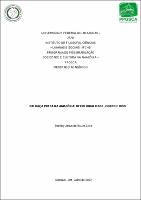| ???jsp.display-item.social.title??? |


|
Please use this identifier to cite or link to this item:
https://tede.ufam.edu.br/handle/tede/9460| ???metadata.dc.type???: | Dissertação |
| Title: | Palhaça Preta na Amazônia: decolonialidade, corpo e riso |
| Other Titles: | Black woman clown in the Amazon: decoloniality, body and laughter |
| ???metadata.dc.creator???: | Lima, Daniely Jesus de Souza  |
| ???metadata.dc.contributor.advisor1???: | Oliveira, Alexandre Santos de |
| ???metadata.dc.contributor.referee1???: | Menezes, Vanja Poty Sandes |
| ???metadata.dc.contributor.referee2???: | Justamand, Michel |
| ???metadata.dc.description.resumo???: | Este trabalho aborda a palhaçaria e a comicidade a partir de questões de gênero e identidade dentro do contexto cultural amazonense. Desse modo, esta pesquisa sugere um diálogo acerca da construção da palhaça Lola, no contexto da cidade de Manaus - AM, tendo como ponto de partida a investigação da palhaça nos recortes raciais e de gênero para pensar de que forma essas questões influenciam no fazer artístico e na comicidade da palhaça Lola. Para tanto, assumindo uma perspectiva decolonial aborda o fazer artístico, de forma a buscar referências cômicas na estética preta. Aqui, entende-se por estética preta no campo das artes cênicas uma concepção da artista, propondo ultrapassar estereótipos sociais. Em contraponto, analisa-se o riso numa perspectiva simbólica, propondo como fenômeno inerente à condição humana, portanto, atravessado por seu contexto histórico e cultural. Busca-se então, verificar possibilidades do riso em uma dimensão anti racista. Como método utilizamos a abordagem qualitativa e o recurso da autobiografia, objetivando relatar minhas vivências como mulher preta na palhaçaria e no espaço acadêmico. Nesse percurso senti a ausência de materiais documentais de outras palhaças pretas, inseridas no espaço acadêmico sobre palhaçaria. Mulheres pretas, ao registrarem suas histórias, propõem um movimento de subversão ao nosso silenciamento histórico e marginalização de nossos corpos. A autobiografia também busca dar suporte e sentido ao dispor de possibilidades de pensar o espaço social e viabilizar interpretações acerca do ser palhaça, dentro de suas especificidades, pensando na necessidade de registrar a palhaçaria preta na cidade de Manaus - AM na perspectiva de primeira pessoa, partindo de percepções sensíveis da palhaça. O principal resultado desta pesquisa sinalizou a dimensão do riso em perspectivas múltiplas, a linguagem da palhaçaria feminista, performance arte, como possibilitadora de liberdade criativa e política da palhaça Lola e a questão da figura cômica e a subversão da sátira à figuras de poder. |
| Abstract: | This paper approaches clowning and comicity based on issues of the female gender and black identities within the Amazonian cultural context. Thus, this research suggests a dialogue about the construction of lola clown, in the context of the city of Manaus - AM, having as a starting point the investigation of clowning in racial and gender clippings to think about how these issues influence the artistic making and comicity of the clown Lola. To this effect, assuming a decolonial perspective approaches the artistic making, in order to seek comic references in black aesthetics. Here, black aesthetics is understood in the field of performing arts a conception of the artist, proposing to overcome social stereotypes. In counterpoint, laughter is analyzed in a symbolic perspective, proposing as a phenomenon inherent to the human condition, therefore, crossed by its historical and cultural context. It is then sought to verify possibilities of laughter in an anti-racist dimension. As a method we used the qualitative approach and the resource of autobiography, aiming to report my experiences as a black woman in clowning and in the academic space. In this journey I felt the absence of documentary materials of other black clowns, inserted in the academic space about clowning. Black women, in recording their stories, propose a movement of subversion to our historical silencing and marginalization of our bodies. The autobiography also seeks to give support and meaning to the disposal of possibilities to think about the social space and enable interpretations about the clowning being, within its specificities, thinking about the need to register black clowning in the city of Manaus - AM from the perspective of first person, starting from sensitive perceptions of clowning. The main result of this research signaled the dimension of laughter in multiple perspectives, the language of feminist clowning, performance art, as a enabler of creative and political freedom of lola clown ing and the issue of the comic figure and the subversion of satire to figures of power. |
| Keywords: | Mulheres nas artes cênicas Negros nas artes cênicas Palhaçaria Representação teatral |
| ???metadata.dc.subject.cnpq???: | CIENCIAS HUMANAS |
| ???metadata.dc.subject.user???: | Sistemas simbólicos Palhaçaria feminista Decolonialidade Corporeidades pretas Riso |
| Language: | por |
| ???metadata.dc.publisher.country???: | Brasil |
| Publisher: | Universidade Federal do Amazonas |
| ???metadata.dc.publisher.initials???: | UFAM |
| ???metadata.dc.publisher.department???: | Instituto de Filosofia, Ciências Humanas e Sociais |
| ???metadata.dc.publisher.program???: | Programa de Pós-graduação em Sociedade e Cultura na Amazônia |
| Citation: | LIMA, Daniely Jesus de Souza. Palhaça Preta na Amazônia: decolonialidade, corpo e riso. 2022. 98 f. Dissertação (Mestrado em Sociedade e Cultura na Amazônia) - Universidade Federal do Amazonas, Manaus (AM), 2022. |
| ???metadata.dc.rights???: | Acesso Aberto |
| URI: | https://tede.ufam.edu.br/handle/tede/9460 |
| Issue Date: | 29-Jul-2022 |
| Appears in Collections: | Mestrado em Sociedade e Cultura na Amazônia |
Files in This Item:
| File | Description | Size | Format | |
|---|---|---|---|---|
| DiSS_DanielyLima_PPGSCA.pdf | 7.49 MB | Adobe PDF |  Download/Open Preview |
Items in DSpace are protected by copyright, with all rights reserved, unless otherwise indicated.




